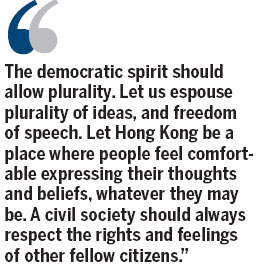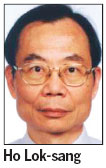Silent majority speaks out
Updated: 2013-08-13 07:17
By Ho Lok-sang(HK Edition)
|
|||||||||

Last Thursday, a press conference was held in the name of the Silent Majority for Hong Kong. I was one of the six conveners for this movement, which sets out to disseminate the message that upholding the rule of law is fundamental to Hong Kong people's well-being and must be defended. Even though I share the same aspiration for an open, fair election system in 2017 as the "Occupy Central" group, I cannot agree to the way they go about trying to achieve what they want. I believe the "Occupy" group is hurting their own cause of justice and democracy.
The "Occupy" group says that Hong Kong is facing a critical moment. Without an election system that commands the support of Hong Kong people at large, the city would become ungovernable. Because of the urgency of the matter, they call upon the public to "occupy Central" so that the SAR government and Beijing will agree to a "true universal suffrage" regime. They disagree to reserving the nomination rights only to the members of the Election Committee.
There is no dispute that the election system should be fair, and if I had my way I would prefer that nominations be as open as are allowed given the requirements of the Basic Law, with the only proviso that the nominee needs to declare support and respect for the "One Country, Two Systems" framework. But we cannot realistically expect any system to please everybody. It is fine and great for every member of the public who is concerned about the election system to contribute to the public debate, to find a system that will work best. But it cannot be right for anyone to insist on a particular election system for others to follow, and to threaten "civil disobedience" if they cannot get what they want, especially when "civil disobedience" hurts innocent people. I hope the "Occupy" group will, instead of occupying the district, seek to recommend a system that is both compatible with their standards and the Basic Law.

The "Occupy" group cited Martin Luther King Jr and Mahatma Gandhi as pioneers in using civil disobedience to achieve their political goals. However, what they were facing represented gross injustice and even oppression either on a racial group or on all the nationals of the country under the rule of colonists. Their acts of civil disobedience did not hurt their fellow citizens unfairly, and the situations truly represented gross injustice. No one in his fair mind would liken Hong Kong today to the situation these two honorable human beings faced then.
By occupying Central, occupiers will disrupt the lives of innocent people going about their ways and earning their livelihood. What gives them the right to hurt innocent people?
It is true that even legal demonstrations will cause disruptions to people's lives, and that is exactly why demonstrators are required to apply for consent from the police to hold demonstrations. This is to ensure that disruptions will be minimized, and that police will be there to help maintain order.
That is why "civil disobedience" that hurts innocent people should be distinguished from civil disobedience that does not. If a black person did not give up his seat to a white person on a bus against a law that requires her to do so, she is not hurting anyone. If an act of civil disobedience is committed willfully to hurt the interest of oppressive colonists, the act is not hurting the interest of countrymen.
That is why I plead to the occupiers for consideration for others. It is important to put yourself in the shoes of others when you do something. We are slipping in our freedom of speech and in the rule of law, not because the government is limiting our freedom of speech and backing down in upholding the rule of law, but because many of us sense pressures from others and have become reluctant to express our ideas openly. I am not directing this complaint against the occupiers, many of whom are very civilized. I had several great and open dialogues with Benny Tai Yiu-ting and Chan Kin-man over the last few days. But I am complaining about people from diverse camps and particularly some of the press who routinely pour abusive language and labels on those who disagree with them. Quite a few of my friends complimented me for my courage in speaking up - the implication being that implicit pressures are now in force making many people become silent.
I felt sad seeing one of my Facebook friends decide that I was "pro-establishment" and deserved to be "unfriended". What made him think that I was "pro-establishment"? What is pro-establishment? I never hesitated to express my criticisms against policies that I deem to be unfair and bad, as readers of this column can readily testify.
The democratic spirit should allow plurality. Let us espouse plurality of ideas, and freedom of speech. Let Hong Kong be a place where people feel comfortable expressing their thoughts and beliefs, whatever they may be. A civil society should always respect the rights and feelings of other fellow citizens. I still think these are some of the core values of Hong Kong which we should all strive to preserve.
The author is a director of the Center for Public Policy Studies at Lingnan University.
(HK Edition 08/13/2013 page1)